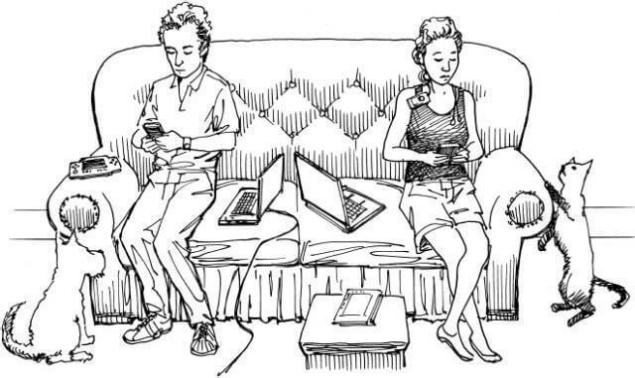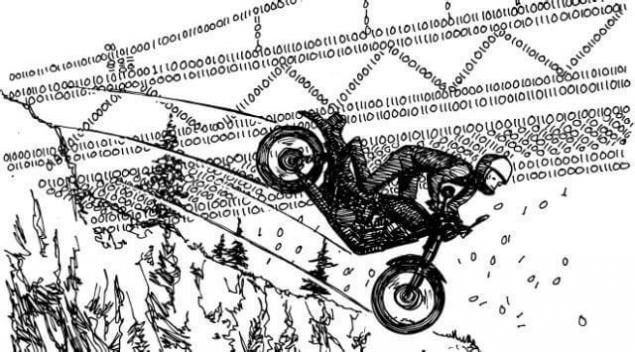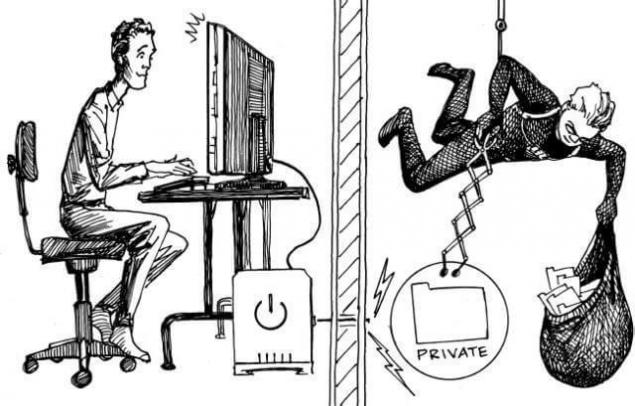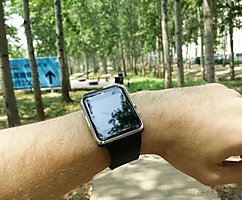10 principles for the digital generation
 Bashny.Net
Bashny.Net
In his book American expert on digital media Douglas Rushkoff have formulated 10 rules that will help you to be not just another user in the network, and to subjugate the online reality.
1. Manage your time

The Internet lives by the rule "here and now", he has no time, because it has long become part of everyday life. Messages, news, events come to us by itself and requires no effort.
"Instead of acting in time, computers operate from decision to decision. Nothing will happen until I write a letter, and then another. The machine is waiting for a command, and the time between commands can be a second, maybe a whole day"
It turns out that computers are faster than people, and people are trying to keep up with the computers. We come to the fact that Rushkoff calls a permanent wait state.
"Every response to the message gives birth to dozens of others. The faster we react, the more waiting that will have to answer again and again. This leads to perpetual stress."
It is important to note that Rushkoff wrote his book three years ago, and since then things got more interesting. We write a post — waiting for likes and comments, serim news — constantly check how she's popular. Devices grew with every new message triggers the notification sound on your tablet and phone and all this again and again. It turns out pretty stressful and time-consuming.
The author sees the decision that the man was able to choose with whom and when to communicate, instead of a long time to hang on the network. Ignore the messages difficult, but the view newsfeed every ten minutes is optional.
2. Don't forget the offline reality

The digital space so well that "reduces" the distance, allowing you to connect people from different parts of the world. But there is a great danger "to escape technique" and stop viewing those who are near. Follow the rule: the smaller the distance, the more live communication. Need to see the difference between "local" and "global", not only in ordinary life, but when creating advertising campaigns, brand positioning, etc.:
"The power of local business and all local activities in establishing relations with a specific region and specific people. A different area is sustainability".
3. Learn to choose, not to obey

The digital world always requires a choice, and not abstract and blurred, and very accurate. Because the Internet, despite all its vastness, has clear boundaries, created by programmers.
When you register, say, in social networks, in the column "marital status" can only specify what the proposed site. Rushkoff believes that this is not the granting of freedom and restriction. It turns out that choosing, we are forced to adapt. The author urges not to click unconsciously: it is better not to choose than to blindly obey the options. Don't narrow your own world to a binary code.
4. Be selective, don't fall for the imaginary simplicity of the web

With the Internet to find answers to any questions was at times easier and faster. There are some pitfalls in the form of excessive haste and reluctance to cross-check information. Rascoff, warns against false information and surface information:
"In the constant rush of the digital world to finish reading the article in Wikipedia is a true luxury, if you already found the right answer."
Grabbing the bare facts, we risk to miss the context, to transform the learning process in pursuit of new and fresh. Without in-depth study of the problem, even the most striking fact may be impaired and soon forgotten. See the links in the same "Wikipedia", which usually gives a good list of references and articles on the topic.
5. Do not confuse the real and the abstract

The digital world is one big abstraction, which is easy to get caught up, if not to Express through her concrete ideas and thoughts. Rascoff, recalls that one of the daily abstractions — the language, what can we say about the Internet, where the scope and limits much more. Virtual abstraction must always be based on something real, then success can be guaranteed. A good example is fantasy baseball, when you create a virtual team players, and points are awarded depending on the actions of real people on the field.
In addition, the network has all its scale, and the more the better. But to expand everything not necessary:
"Dominated, as a rule, those who raises the level of abstraction. But if we remember that one scale is not suitable for all, we can save the local and the specific units in terms of the requirements of globalization"
Global usually wins the local search engines benefit from the sites, and aggregators from search engines. But this is not an axiom. If you define for yourself a niche, albeit not too large, you can always get a good and sustainable place.
6. Be yourself

The digital world is impersonal, often anonymous. But anonymity gives the opportunity to speak do not hesitate, suppressing a sense of responsibility. The result — excessive cruelty, grafomanstvo and hatred.
The second problem is the misunderstanding of the interlocutor because of the inability to see it. The author compares this phenomenon with Asperger's Syndrome: dependence on words because of the inability to look in the eyes. This leads to confusion, random insults and fruitless attempts to understand someone else's idea. Some particularly impressionable people can have the whole day to consider the message, wondering what it was: irony, a harmless joke or a serious statement? And most importantly – how to respond??? Better not be afraid to ask again. Let there be more questions instead of the abyss of misunderstanding.
And there is a third what writes of Rashkoff, but he knows another author — Paul Graham ("What you don't have to say"). Talking about fashion in words and forms of expression. Sometimes you see her photo three years ago and think, "God, what I'm wearing", and then it seemed very norms. So it is with posts in Facebook, and with tweets and messages.
If you notice, not so long ago was all the rage caps that filled the entire tape on Twitter. Now people often use brackets, which reveal the "unsaid" in the main part. Until recently it was possible to meet some kind of approval, and after it – "(actually not)". The problem with trendy words and forms — they are boring. So better think twice whether you want to put it that way.
7. Don't sell your friends

The conviction Rascoff, the meaning of Internet communication, but not the money or the content. The main function of the digital world will always be communication, and any attempts to make him money will ruin all the philosophy and integrity of the network.
Your friends is not a clot of content, they – something that the Internet exists and develops. No need to mindlessly charity advertising the post and give it to friends in the hands of marketers. Brands also have something to think about. With Intrusive banners, the number of subscribers does not increase, but the socialization of the brand, the creation of conditions for communication of the consumers will lead to positive results.
8. Tell the truth

With the advent of digital media, information spreads at lightning speed to hide the truth is becoming increasingly difficult. People, however, still Excel as they can — fake reviews, the black optimisation, seeding viral content, but it is short-lived. Once a person realizes that he had been deceived, he will never return, and even posted warnings in all social networks. Check the information came easily, it makes the lies an incredibly vulnerable. The number one rule: want to sell a product — make it quality and do not invent.
9. Share instead of steal

The network is designed to be open, this is its meaning, and one of the main advantages. The Internet helps us to share with each other what we have to tell about themselves, their work and projects. But as soon as the line between sharing and stealing, openness plays against us.
10. Learn to code

Digital reality created by programmers. They define where you begin and end your freedom in the network, what are the limitations and things you would never do even with a great desire. In order not to become hostage to the matrix, it is necessary to learn to program yourself.
See also: Michael Labkovsky: Worry because insignificant means to be neurotic
What is wrong with you?
If "mom the teacher and dad the pianist" and learn to code strictly impossible, it is desirable to at least slightly understand how the processes in the network and what is their fundamental difference from the offline reality. Otherwise you can fall into the trap and become a victim of the ruthless monetization of other people's initiatives.published
P. S. And remember, only by changing their consumption — together we change the world! ©
Source: muz4in.net/news/10_principov_pokolenija_digital_duglas_rashkoff/2013-07-15-33241
1. Manage your time

The Internet lives by the rule "here and now", he has no time, because it has long become part of everyday life. Messages, news, events come to us by itself and requires no effort.
"Instead of acting in time, computers operate from decision to decision. Nothing will happen until I write a letter, and then another. The machine is waiting for a command, and the time between commands can be a second, maybe a whole day"
It turns out that computers are faster than people, and people are trying to keep up with the computers. We come to the fact that Rushkoff calls a permanent wait state.
"Every response to the message gives birth to dozens of others. The faster we react, the more waiting that will have to answer again and again. This leads to perpetual stress."
It is important to note that Rushkoff wrote his book three years ago, and since then things got more interesting. We write a post — waiting for likes and comments, serim news — constantly check how she's popular. Devices grew with every new message triggers the notification sound on your tablet and phone and all this again and again. It turns out pretty stressful and time-consuming.
The author sees the decision that the man was able to choose with whom and when to communicate, instead of a long time to hang on the network. Ignore the messages difficult, but the view newsfeed every ten minutes is optional.
2. Don't forget the offline reality

The digital space so well that "reduces" the distance, allowing you to connect people from different parts of the world. But there is a great danger "to escape technique" and stop viewing those who are near. Follow the rule: the smaller the distance, the more live communication. Need to see the difference between "local" and "global", not only in ordinary life, but when creating advertising campaigns, brand positioning, etc.:
"The power of local business and all local activities in establishing relations with a specific region and specific people. A different area is sustainability".
3. Learn to choose, not to obey

The digital world always requires a choice, and not abstract and blurred, and very accurate. Because the Internet, despite all its vastness, has clear boundaries, created by programmers.
When you register, say, in social networks, in the column "marital status" can only specify what the proposed site. Rushkoff believes that this is not the granting of freedom and restriction. It turns out that choosing, we are forced to adapt. The author urges not to click unconsciously: it is better not to choose than to blindly obey the options. Don't narrow your own world to a binary code.
4. Be selective, don't fall for the imaginary simplicity of the web

With the Internet to find answers to any questions was at times easier and faster. There are some pitfalls in the form of excessive haste and reluctance to cross-check information. Rascoff, warns against false information and surface information:
"In the constant rush of the digital world to finish reading the article in Wikipedia is a true luxury, if you already found the right answer."
Grabbing the bare facts, we risk to miss the context, to transform the learning process in pursuit of new and fresh. Without in-depth study of the problem, even the most striking fact may be impaired and soon forgotten. See the links in the same "Wikipedia", which usually gives a good list of references and articles on the topic.
5. Do not confuse the real and the abstract

The digital world is one big abstraction, which is easy to get caught up, if not to Express through her concrete ideas and thoughts. Rascoff, recalls that one of the daily abstractions — the language, what can we say about the Internet, where the scope and limits much more. Virtual abstraction must always be based on something real, then success can be guaranteed. A good example is fantasy baseball, when you create a virtual team players, and points are awarded depending on the actions of real people on the field.
In addition, the network has all its scale, and the more the better. But to expand everything not necessary:
"Dominated, as a rule, those who raises the level of abstraction. But if we remember that one scale is not suitable for all, we can save the local and the specific units in terms of the requirements of globalization"
Global usually wins the local search engines benefit from the sites, and aggregators from search engines. But this is not an axiom. If you define for yourself a niche, albeit not too large, you can always get a good and sustainable place.
6. Be yourself

The digital world is impersonal, often anonymous. But anonymity gives the opportunity to speak do not hesitate, suppressing a sense of responsibility. The result — excessive cruelty, grafomanstvo and hatred.
The second problem is the misunderstanding of the interlocutor because of the inability to see it. The author compares this phenomenon with Asperger's Syndrome: dependence on words because of the inability to look in the eyes. This leads to confusion, random insults and fruitless attempts to understand someone else's idea. Some particularly impressionable people can have the whole day to consider the message, wondering what it was: irony, a harmless joke or a serious statement? And most importantly – how to respond??? Better not be afraid to ask again. Let there be more questions instead of the abyss of misunderstanding.
And there is a third what writes of Rashkoff, but he knows another author — Paul Graham ("What you don't have to say"). Talking about fashion in words and forms of expression. Sometimes you see her photo three years ago and think, "God, what I'm wearing", and then it seemed very norms. So it is with posts in Facebook, and with tweets and messages.
If you notice, not so long ago was all the rage caps that filled the entire tape on Twitter. Now people often use brackets, which reveal the "unsaid" in the main part. Until recently it was possible to meet some kind of approval, and after it – "(actually not)". The problem with trendy words and forms — they are boring. So better think twice whether you want to put it that way.
7. Don't sell your friends

The conviction Rascoff, the meaning of Internet communication, but not the money or the content. The main function of the digital world will always be communication, and any attempts to make him money will ruin all the philosophy and integrity of the network.
Your friends is not a clot of content, they – something that the Internet exists and develops. No need to mindlessly charity advertising the post and give it to friends in the hands of marketers. Brands also have something to think about. With Intrusive banners, the number of subscribers does not increase, but the socialization of the brand, the creation of conditions for communication of the consumers will lead to positive results.
8. Tell the truth

With the advent of digital media, information spreads at lightning speed to hide the truth is becoming increasingly difficult. People, however, still Excel as they can — fake reviews, the black optimisation, seeding viral content, but it is short-lived. Once a person realizes that he had been deceived, he will never return, and even posted warnings in all social networks. Check the information came easily, it makes the lies an incredibly vulnerable. The number one rule: want to sell a product — make it quality and do not invent.
9. Share instead of steal

The network is designed to be open, this is its meaning, and one of the main advantages. The Internet helps us to share with each other what we have to tell about themselves, their work and projects. But as soon as the line between sharing and stealing, openness plays against us.
10. Learn to code

Digital reality created by programmers. They define where you begin and end your freedom in the network, what are the limitations and things you would never do even with a great desire. In order not to become hostage to the matrix, it is necessary to learn to program yourself.
See also: Michael Labkovsky: Worry because insignificant means to be neurotic
What is wrong with you?
If "mom the teacher and dad the pianist" and learn to code strictly impossible, it is desirable to at least slightly understand how the processes in the network and what is their fundamental difference from the offline reality. Otherwise you can fall into the trap and become a victim of the ruthless monetization of other people's initiatives.published
P. S. And remember, only by changing their consumption — together we change the world! ©
Source: muz4in.net/news/10_principov_pokolenija_digital_duglas_rashkoff/2013-07-15-33241
Tags
See also
Chinese copy
10 decisions that you need to take now to spare no 10 years later.
9 important facts about quantum computers, which will help you understand what it is
The best robots at CES 2016
Douglas Graham. Diet 80 Oct. 10 Audiobook.
Ken Robinson: We are educating children from creativity
5 tips that will help to save on online shopping
10 amazing online resources that will help you improve memory and logic.
As the slogan for you mobile operator - "It's for you"? RA "Hippo" for JSC "Baikalwestcom"
















